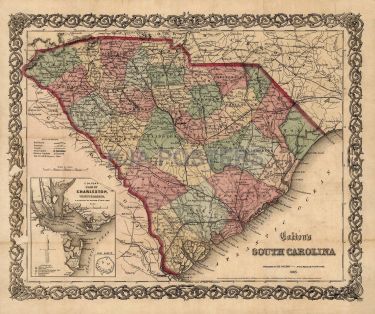 From the swelling ranks of freedmen, African Baptist churches are now forming in Union-controlled areas of coastal South Carolina. This month freed slaves form the First African Baptist Church of Bluffton, a community just across the inland waterway from Hilton Head Island. The new congregation is the first Baptist church formed in the community.
From the swelling ranks of freedmen, African Baptist churches are now forming in Union-controlled areas of coastal South Carolina. This month freed slaves form the First African Baptist Church of Bluffton, a community just across the inland waterway from Hilton Head Island. The new congregation is the first Baptist church formed in the community.
The Rev. Abraham (or Abram) Murchison (or Merchison), a former slave from Savannah who is literate and becomes a prolific church planter, is the founding pastor of the congregation. Twelve deacons establish the church with Murchison.
Freed by the Union Army and ordained to the ministry by Union chaplains, Murchison resides on Hilton Head Island during the war, recruiting freedmen for the Union Army and serving as religious and secular leader among the region’s blacks. He reportedly baptizes over 1,000 freedmen during the war. Murchison also founds and administrates the nearby freedmen village of Mitchelville.
A New York Times correspondent, visiting Union-occupied Hilton Head Island, relates the following first-hand account of Alexander Murchison.
I went last evening to meeting in the negro quarter. The large room in which it was held was well filled, and by negroes, excepting some fifteen or twenty soldiers and white civilians. The preacher was Rev. ABRAHAM MURCHISON, who follows the Apostolic example of earning his daily bread by temporal work, and who at present honors “the mess,” by serving as chief cook. ABRAHAM is a remarkable negro, and is often compared to Mrs. STOWE’s ideal “Uncle Tom.” His sermon was marked by considerable originality and a closeness of logic that surprised me; and the evident sincerity of his ministrations gave it an interest which does not always attend more pretentious efforts.
His congregation was attentive and decorous. A large majority were men, owing, I suppose, to the preponderance of males here demanded by the prosecution of Governmental business. All were decently dressed; some of the women indulging in jewelry and hoops that might have excited the admiration of those of pale complexion. The distinguishing feature in their dress was the turban, which is generally worn, and with a good deal of grace, giving to them an oriental and picturesque appearance. These head-dresses are of all colors, from the neutral tint up to the flaming red, and not unfrequently combining half a dozen colors in a plaid. The fashionable bonnet of the white woman has not yet secured any extensive introduction; though, amongst a class of ladies indifferent to the preservation of their complexions, I judge that an article so well adapted to expose the features will not fail eventually to achieve a great popularity…
This ABRAM is a character. From the members of the mess which enjoy his services I hear many anecdotes and opinions, which go to show him to be a man of very considerable intelligence and ability. His influence over the negroes here is immense, and the Generals in command do not despise his aid. A few days ago, he was sent for by Gen. HUNTER, at which ABRAM was filled with the greatest “extonishment.” “Dat General,” said he, afterward, “is smart — he got an eye dat looks troo a man. When he looked at me, I thought his eye go clean troo me — I tout I could see it behind, me. Dat a berry smart General, sah; I know he be a fightin’ General, by he looks!”
A few Sabbaths since, one of the chaplains preached at the negro meeting, after which ABRAM followed in a few remarks. “I was berry glad,” said he, “to hear de brudder speak so well of de ‘postle Paul. ‘Postle Paul was a good man; he was a educated man, and was acquainted wid all de arts and sciences, havin’ been rared up at de feet of old Doctor Gamaliel.”
The First African Baptist Church of Bluffton, later renamed the First Zion Missionary Baptist Church, survives the war and thrives in the years following, remaining active to the present.
Sources: “A Negro Conventicle, The Rev. Abraham Murchison,” New York Times, April 19, 1862 (link); Clarence L. Mohr, On the Threshold of Freedom: Masters and Slaves in Civil War Georgia, Athens: University of Georgia Press, 1986, pp. 83-85 (link); “Town of Bluffton Proclamation” (link); Catherine Carthy Harley, “First Zion Missionary Baptist Church of Bluffton Recognizes Female Pioneers,” Beaufort Gazette, March 17, 2012 (link)


